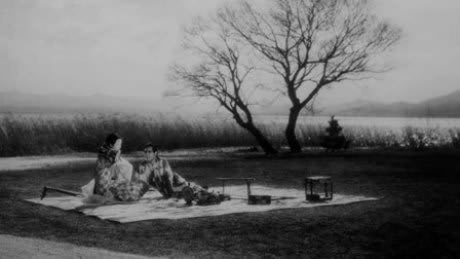An interpretation of a selection of Udea Akinari's versions of ancient Japanese ghost stories as collected in his classic 1776 book, Tales of Moonlight and Rain, Kenji Mizoguchi's Ugetsu is a classic of its own medium. The 1953 screen version of an admonitory folktale about the dangerous cost of falling for the lure of avarice is regarded as a seminal entry in the golden age of Japanese film and credited, along with the early works of Akira Kurosawa, for bringing attention to eastern cinema in the west.
Like much Japanese folklore, Ugetsu is a simple morality tale involving honour and temptation as manifested by a lonely spirit. In Akinari's revision, the story plays out within the historical context of a 16th century civil war between warring lords.
Mizoguchi treats the tale with reverence and shoots it with elegance, favouring long, smooth takes with measured, gliding cinematography. There isn't a lot of visual symbolism to enhance the film's themes; it's a literal interpretation content with clean, efficient storytelling.
War is on the horizon, and a farmer named Genjuro (Masayuki Mori), who also crafts exquisite pottery, decides to risk a run to a nearby town to hock his wares before travel becomes too dangerous.
Joining him for the journey is big-dreaming Tobei (Eitaro Ozawa) – "ambition must be as boundless as the ocean" – who's intent on becoming a samurai, despite having no training. Their haul is lucrative and both men are bitten by the greed and confidence of a full belly and coin purse.
At home, their more sensibly minded wives (played by the excellent Kinuyo Tanaka and Mitsuko Mito) are pleased with the gifts their husbands bring back, but take great pains to make it known that their pleasure is out of the kindness of the giving, not the objects themselves; the gift of company and the sanctity of the family unit is the greatest gift of all.
The men, obsessed with wealth and stature, won't listen when the women beg them not to worry about the unending cycle of acquisition. Not even when the village is raided and looted do they desist, returning to the site to gather more pottery to sell and continuing with a dangerous voyage—bad omens and the safety of their spouses be damned.
Both men find what they're looking for, but at a cost neither is prepared to pay, even though they do so willingly.
Ugetsu is a beautiful and heartbreaking look at the illusory value of material wealth that doesn't shy away from showing that the self-absorbed behaviour men inflict upon women is far more horrifying than any restless spirit.
Ugetsu screens at the TIFF Bell Lightbox as part of the Japanese Divas retrospective.
(Daiei Studios)Like much Japanese folklore, Ugetsu is a simple morality tale involving honour and temptation as manifested by a lonely spirit. In Akinari's revision, the story plays out within the historical context of a 16th century civil war between warring lords.
Mizoguchi treats the tale with reverence and shoots it with elegance, favouring long, smooth takes with measured, gliding cinematography. There isn't a lot of visual symbolism to enhance the film's themes; it's a literal interpretation content with clean, efficient storytelling.
War is on the horizon, and a farmer named Genjuro (Masayuki Mori), who also crafts exquisite pottery, decides to risk a run to a nearby town to hock his wares before travel becomes too dangerous.
Joining him for the journey is big-dreaming Tobei (Eitaro Ozawa) – "ambition must be as boundless as the ocean" – who's intent on becoming a samurai, despite having no training. Their haul is lucrative and both men are bitten by the greed and confidence of a full belly and coin purse.
At home, their more sensibly minded wives (played by the excellent Kinuyo Tanaka and Mitsuko Mito) are pleased with the gifts their husbands bring back, but take great pains to make it known that their pleasure is out of the kindness of the giving, not the objects themselves; the gift of company and the sanctity of the family unit is the greatest gift of all.
The men, obsessed with wealth and stature, won't listen when the women beg them not to worry about the unending cycle of acquisition. Not even when the village is raided and looted do they desist, returning to the site to gather more pottery to sell and continuing with a dangerous voyage—bad omens and the safety of their spouses be damned.
Both men find what they're looking for, but at a cost neither is prepared to pay, even though they do so willingly.
Ugetsu is a beautiful and heartbreaking look at the illusory value of material wealth that doesn't shy away from showing that the self-absorbed behaviour men inflict upon women is far more horrifying than any restless spirit.
Ugetsu screens at the TIFF Bell Lightbox as part of the Japanese Divas retrospective.




